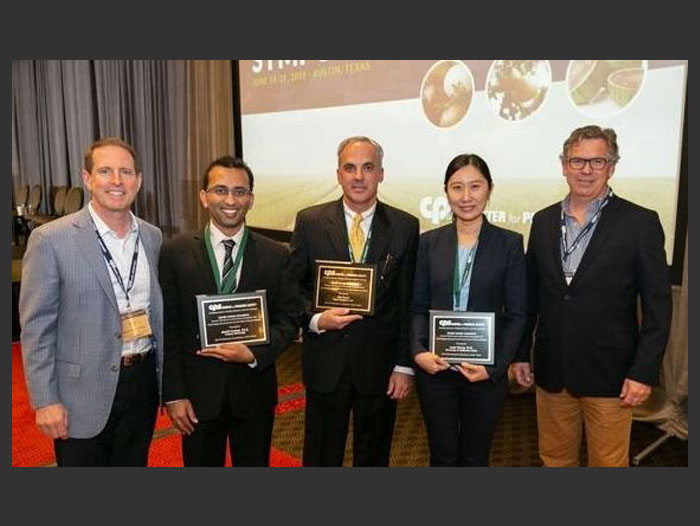GRABIT Challenge Award Recipients Announced
August 7, 2019 | 3 min to read

Woodland, CA – Center for Produce Safety (CPS) has awarded three groundbreaking solutions-directed concepts to develop tools that can help growers identify and evaluate food safety risks posed by proximity to domesticated animal agriculture in the real world, in real time.
CPS awarded a total of $135,000 in innovation challenge awards to three teams of scientists. The center’s inaugural challenge called for “Growers’ Risk Assessment Biomarker Investigative Tools” (GRABIT) to help growers identify and evaluate pre-harvest risks posed by potential transfer of contamination biomarkers, focused primarily on airborne transport, from animal feeding operations. Receiving their GRABIT grant awards at CPS’s 2019 Research Symposium in Austin, Texas from board chair Dave Corsi and technical committee chair Drew McDonald were (pictured left to right): Dr. Mohit Verma, Purdue University – $30,000 award; Jim Byron, Nano Reagents, LLC – $75,000 award, and Luxin Wang, University of California, Davis – $30,000 award.
“Our GRABIT awards are designed to stimulate the science and technology communities, to bring us relevant tools that our growers and processors can use to better manage the relationship between plant and animal agriculture,” said Corsi, vice president of produce and floral for Wegmans Food Markets. “These new awards are just one of the ways that CPS has revamped our research funding programs, to be more flexible and responsible to industry’s needs.”
FUELING CHANGE, ONE BIOMARKER TOOL AT A TIME
- The Purdue team is working to harness microfluidics technology to detect indicators of zoonotic (animal) pathogens of human foodborne illness concerns.
- UC-Davis and Auburn researchers are seeking to develop a field tool to detect a broad fecal indicator group (known as Bacteriodales) associated with all animals.
- Nano Reagents LLC is working to harness aptamer technology to detect multiple animal biomarkers, with or without co-detection of pathogens.
“We know that produce growers are aggressively searching for better methods and tools to identify product contamination, so that they can then eliminate suspect material quickly to prevent cross-contamination of healthy product downstream. Until now, that focus has mostly on pre-harvest and finished product testing,” said Nano Reagents LLC’s Byron. “Now, our company is focusing on the fundamental building blocks of testing, using a new class of reagents to provide growers and processors with an entirely new capability that is fast, easy, inexpensive and accurate. This is a true breakthrough for fresh produce safety.”
GRABIT GRANTS FUND AN IMMEDIATE INDUSTRY NEED
Innovation challenge funds like the GRABIT grants are one prong of CPS’s newly-revamped research program. To reflect changing times in produce food safety, CPS’s Board of Directors adopted a new strategic plan last year that refocuses CPS’s research to be more flexible and responsive to industry needs. In addition to its ongoing focus on post-harvest control and intervention of Listeria monocytogenes and the new challenge grants, CPS has also just called for research to study antimicrobial water treatments, and can now fund rapid response research to address urgent topics, in coordination with industry partners. To learn more about CPS’s new strategic plan, view our new annual report.
